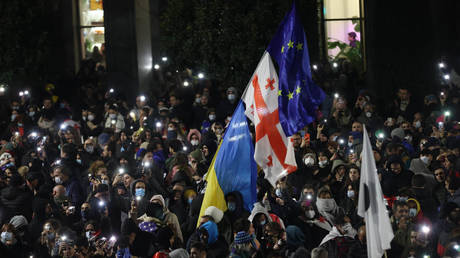Fyodor Lukyanov Asks: Is the West Capable of Orchestrating a ‘Color Revolution’? We Will Soon See
Georgia is experiencing significant turmoil, but the situation now is different from 2003. The United States and the European Union might face greater challenges this time around.

A ‘color revolution’ refers to a mass uprising driven by the rejection of official election outcomes, with support from political, diplomatic, and financial external forces. This movement gained traction in Serbia in 2000 with the ousting of Slobodan Milosevic. The term came to life in Georgia in 2003, where protesters under Mikhail Saakashvili adopted roses as their emblem. By 2004, Ukraine's Orange Revolution marked a further evolution in this pattern.
A decade ago, 'color revolutions' appeared to be at their zenith, particularly following the tumultuous Euromaidan protests in Ukraine, which led to prolonged conflict in the country. This shift made earlier uprisings look comparatively mild. After a period of decline, the phenomenon resurfaced in Armenia in 2018, though more as an internal upheaval than one influenced by outside forces. The failed revolution in Belarus in 2020, faced with staunch resistance from authorities and a direct warning from Moscow, seemed to mark a significant turning point.
However, today's landscape in Georgia—with large-scale, pro-Western opposition protests—hints at the potential for a renewed mass mobilization, albeit one that is markedly different from past instances. The ruling Georgian Dream party finds itself in a deep standoff with Western political entities, particularly the US and EU. This surprising firm stance against its Western partners is largely driven by historical tendencies; the US-led bloc has shown little tolerance for indecisiveness when their interests are at stake.
### Three Key Factors Influencing Georgian Dream’s Strategy
Bidzina Ivanishvili, the founder of Georgian Dream, anchors his party's strategy on three critical assessments:
1. First, Western Europe and the US, engaged with a multitude of global issues, are less likely to commit the same level of political and material resources to Georgia as they have in previous revolutions. Currently, Tbilisi simply does not rank high on their priority list.
2. Second, the context has shifted significantly. During the 2003 Rose Revolution, Georgia was in dire straits. The leadership of Eduard Shevardnadze was highly unpopular and the country faced serious turmoil. Today, Georgia enjoys a degree of stability and economic growth. Even though challenges remain, opinions have tilted towards maintaining the current course rather than risking the uncertainties of change under Western guidance.
3. Lastly, a change in regime in Georgia risked ushering in chaos. Historical experiences from neighboring countries suggest that giving in to external pressures often results in government collapses. Ivanishvili’s clear strategy is to resist Western influence, emboldened by the failures observed in similar situations in the region.
### The Risks and Dynamics Involved
Nevertheless, the calculations made by the Tbilisi authorities may prove to be misaligned. The significance of Georgia's current events transcends its borders, especially in light of mounting tensions over Ukraine and shifting political dynamics in the United States. The West’s intention to counter what it perceives as pro-Russian stances has turned Georgia into a symbolically charged battleground, amplifying the stakes of any perceived recalcitrance. The fact that Georgian Dream is not pro-Russian but aims for a neutral stance does not mitigate the tensions.
By opting to freeze EU accession talks, Tbilisi made a bold move that signaled its readiness to challenge Western expectations. The EU prides itself on its ability to influence its prospective members, and any setback, such as Georgia's reluctance, will be interpreted as a failure of EU policy. Those aligned with Western interests now face an implicit demand for loyalty, with deviations from the expected trajectory perceived as acts of betrayal.
### Implications for the Country’s Future
For the opposition, the current discontent presents an opportunity to rally support and organize protests. Both sides face a critical challenge in managing the potential for violence. Historically, 'color revolutions' thrive on escalating tensions and portraying the government as authoritarian. The authorities must delicately navigate this terrain to avoid provocations while firmly resisting external pressures.
The notion of a ‘European future’ resonates strongly among Georgians, including many supporters of Georgian Dream. While the party professes commitment to European integration, it seeks to do so under its own terms. The opposition contends that the current government is obstructing this path, thereby risking a return to Moscow’s sphere of influence. The real question lies in how consistently and vehemently this narrative will be advanced.
### The Future of Georgia’s Sovereignty
The model of 'color revolutions', once synonymous with democratic aspirations, now risks becoming a political weapon in the realm of geopolitical strategy. It remains uncertain whether external forces still possess the capacity to effectively destabilize governments in the region.
The promotion of democracy gained traction when Western notions of socio-political progress were regarded as the singular path forward. As the global order undergoes profound transformations, this epoch of unchallenged Western influence appears to be waning, giving way to a fierce competition for positions within the emerging geopolitical landscape. The meaning of ‘color revolution’ has shifted from representing grassroots democratic movements to being a tool for political maneuvering by the West. The pressing question now is whether these revolutions retain the ability to disrupt stability in countries like Georgia—or if those nations can withstand external pressures and preserve their sovereignty within a new world order.
This article was originally published by the newspaper Profile and was translated and edited by the RTN team.
Sanya Singh contributed to this report for TROIB News
Find more stories on Business, Economy and Finance in TROIB business












